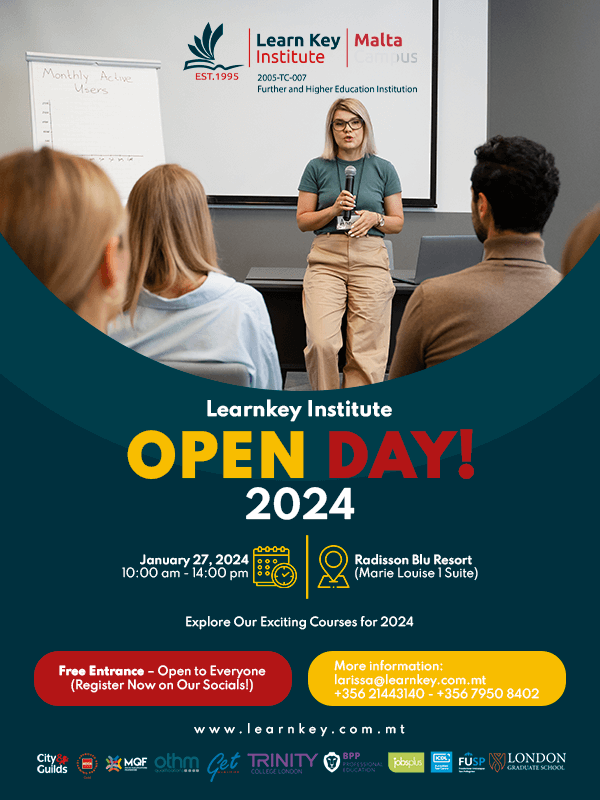LEARN KEY INSTITUTE MALTA
Procedure for the selection of staff through Erasmus+ programme (KA131- KA171 outgoing)
Staff mobility selection procedure
KA131 – programme countries (EU member states and third countries associatedtothe proagramme) & KA171 – partner countries (third countries non associated totheprogramme)
1. Purpose of the procedure
This procedure outlines the transparent, fair, and inclusive process used by LearnKeyInstitute (LKI) for the selection of academic, administrative, and technical staff
participating in Erasmus+ staff mobilities, including:
KA131 – Mobility with Programme Countries
KA171 – Mobility with Third Countries not associated to the Programme
It ensures alignment with the Erasmus Charter for Higher Education (ECHE), LKI’s
mission to internationalise teaching, training, and institutional development, andtheprinciples of equity, diversity, and inclusion.
2. Types of eligible staff mobility
Staff Mobility for Teaching (STA)
For academic staff delivering teaching abroad.
Staff Mobility for Training (STT)
For administrative, academic, or technical staff participating in:
Job shadowing
Workshops and seminars
Institutional capacity-building visits
3. Eligibility requirements
To apply, staff must:
Be employed by Learn Key Institute (full-time or part-time).
Demonstrate relevance of the mobility to their current role and LKI’s internationalisation strategy.
Ensure availability for the proposed mobility period.
Hold or commit to developing appropriate language competences for the host institution.
Submit a complete application by the deadline.
4. Application procedure
4.1 Required Documents
Applicants must submit:
Application Form
Motivation Letter (detailing relevance, expected impact, and alignment withLKI’s mission)
CV (Europass format preferred)
Proof of Language Competence (self-evaluation or certificates)
Invitation or acceptance letter from the host institution (if available)
4.2 Submission
Applications are submitted electronically to the Erasmus+ Office via the mobilityportal or official email.
5. Selection committee
The selection of staff is carried out by the Erasmus+ Mobility Selection Committee, composed of:
Erasmus+ Institutional Coordinator (Chair)
Academic or Administrative Director
One Quality Assurance representative (observer)
The committee ensures transparency, impartiality, and documentation of all decisions.
6. Selection criteria
Applications will be evaluated on a points-based matrix to ensure fairness. Thecriteria include:
6.1 Relevance to Institutional Goals (30%)
Contribution to LKI’s internationalisation mission
Expected impact on curriculum development, innovation, or institutional capacity
Alignment with departmental needs
6.2 Added Value for the Applicant (25%)
Contribution to professional development
Potential for long-term benefit to the applicant’s role
Engagement in past LKI initiatives
6.3 Motivation and Preparedness (20%)
Quality and clarity of the motivation letter
Demonstrated commitment to implement and disseminate results
Clear learning or teaching objectives
6.4 Language Competence (15%)
Ability to communicate effectively at the host institution
Certifications or self-assessed proficiency
6.5 Contribution to New or Strategic Partnerships (10%)
Mobilities supporting KA171 regions and new cooperation pathways
Mobilities strengthening existing partnerships
Special consideration is given to:
Staff with less mobility experience (to ensure inclusiveness)
Staff supporting LKI’s long-term institutional strengthening
Mobilities that create new academic or research collaborations
7. Tie-breaker rules
If applicants receive equal scores, priority is given in the following order:
Staff who have not previously participated in Erasmus+ mobility
Staff from underrepresented departments
Mobilities contributing to new partner countries or KA171 priorities
Women and staff from disadvantaged backgrounds (in line with E+ inclusionprinciples)
8. Transparency and notification
All applicants are:
Informed of the results via email
Provided with feedback upon request
Given an opportunity to appeal within 7 days
9. Grant allocation
Grant amounts follow Erasmus+ programme rules. In cases of limited funding:
Higher-ranked applicants are prioritised
Lower-ranked applicants may be placed on a reserve list
Virtual or blended mobility may be offered as an alternative
10. Responsibilities of selected staff
Selected staff must:
Prepare a mobility programme (Mobility Agreement)
Attend pre-departure briefing
Complete mandatory reporting (EU Survey, final report)
Disseminate results at departmental and institutional level through:
Staff meetings
Workshops
Internal presentations
Contributions to quality or curriculum improvements
For KA171 staff, the cultural and regional dimension must be included in the dissemination.
11. Monitoring and evaluation
The Erasmus+ Office monitors:
Achievement of mobility goals
Impact on staff performance and institutional development
Contribution to international cooperation (especially for KA171)
Feedback is integrated into LKI’s annual Erasmus+ quality review.
12. Compliance with ECHE and LKI international strategy
This selection procedure fully reflects:
ECHE principles of fairness, transparency, and inclusion
LKI’s mission to foster international mobility, innovation, and cross-border cooperation
LKI’s vision to build a globally connected, learner-centered, and future- oriented institution
Download E+ procedures for staff


